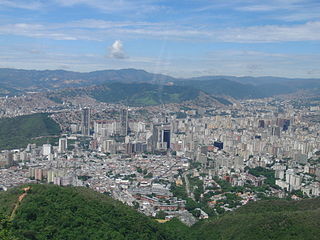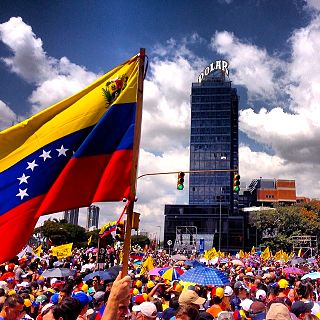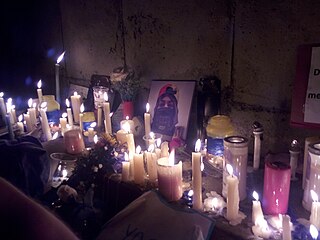
Caracas, officially Santiago de León de Caracas (CCS), is the capital and largest city of Venezuela, and the center of the Metropolitan Region of Caracas. Caracas is located along the Guaire River in the northern part of the country, within the Caracas Valley of the Venezuelan coastal mountain range. The valley is close to the Caribbean Sea, separated from the coast by a steep 2,200-meter-high (7,200 ft) mountain range, Cerro El Ávila; to the south there are more hills and mountains. The Metropolitan Region of Caracas has an estimated population of almost 5 million inhabitants.

The 2008 Bolivian political crisis saw protests against President Evo Morales and calls for greater autonomy for the country's eastern departments. Demonstrators escalated the protests by seizing natural gas infrastructure and government buildings. In response, supporters of the national government and its reform of the constitution, mobilized across these regions.

Jacqueline Coromoto Faría Pineda is a Venezuelan politician. She was the head of the state mobile phone company Movilnet Minister of Environment and Natural Resources (2005–2007), and head of Caracas' water company, Hidrocapital. She is a hydraulic civil engineer by profession.

In 2014, a series of protests, political demonstrations, and civil insurrection began in Venezuela due to the country's high levels of urban violence, inflation, and chronic shortages of basic goods and services. Explanations for these worsening conditions vary, with analysis blaming strict price controls, alongside long-term, widespread political corruption resulting in the under-funding of basic government services. While protests first occurred in January, after the murder of actress and former Miss Venezuela Mónica Spear, the 2014 protests against Nicolás Maduro began in earnest that February following the attempted rape of a student on a university campus in San Cristóbal. Subsequent arrests and killings of student protesters spurred their expansion to neighboring cities and the involvement of opposition leaders. The year's early months were characterized by large demonstrations and violent clashes between protesters and government forces that resulted in nearly 4,000 arrests and 43 deaths, including both supporters and opponents of the government. Toward the end of 2014, and into 2015, continued shortages and low oil prices caused renewed protesting.

The 2014 Venezuelan protests began in February 2014 when hundreds of thousands of Venezuelans protested due to high levels of criminal violence, inflation, and chronic scarcity of basic goods because of policies created the Venezuelan government. The protests have lasted for several months and events are listed below according to the month they had happened.

In 2014, a series of protests, political demonstrations, and civil insurrection began in Venezuela due to the country's high levels of urban violence, inflation, and chronic shortages of basic goods attributed to economic policies such as strict price controls. Mass protesting began in earnest in February following the attempted rape of a student on a university campus in San Cristóbal. Subsequent arrests and killings of student protesters spurred their expansion to neighboring cities and the involvement of opposition leaders. The year's early months were characterized by large demonstrations and violent clashes between protesters and government forces that resulted in nearly 4,000 arrests and 43 deaths, including both supporters and opponents of the government.

2015 protests in Venezuela began in the first days of January primarily due to shortages in the country, with the first massive demonstration occurring on 23 January, on the anniversary of the 1958 coup d'etat against dictator Marcos Pérez Jiménez. The series of protests originally began in February 2014 when hundreds of thousands of Venezuelans protested due to high levels of criminal violence, inflation, and chronic scarcity of basic goods because of policies created the Venezuelan government. As of January 2015, over 50 people had been arrested for protesting. The protests are listed below according to the month they had happened.

2016 protests in Venezuela began in early January following controversy surrounding the 2015 Venezuelan parliamentary elections and the increasing hardships felt by Venezuelans. The series of protests originally began in February 2014 when hundreds of thousands of Venezuelans protested due to high levels of criminal violence, inflation, and chronic scarcity of basic goods because of policies created by the Venezuelan government though the size of protests had decreased since 2014.

The 2017 Venezuelan protests began in late January following the abandonment of Vatican-backed dialogue between the Bolivarian government and the opposition. The series of protests originally began in February 2014 when hundreds of thousands of Venezuelans protested due to high levels of criminal violence, inflation, and chronic scarcity of basic goods because of policies created by the Venezuelan government though the size of protests had decreased since 2014. Following the 2017 Venezuelan constitutional crisis, protests began to increase greatly throughout Venezuela.

The Mother of All Marches, also known as the Mother of All Protests, was a day of protests held on April 19, 2017, in Venezuela against the Chavista government of president Nicolás Maduro. The protests began after the Supreme Tribunal of Justice dissolved the National Assembly and took over its legislative powers March 29, 2017 in what was called a self-coup. The dissolution of the National Assembly was reversed shortly thereafter on April 1, 2017.

The 2017 Venezuelan protests were a series of protests occurring throughout Venezuela. Protests began in January 2017 after the arrest of multiple opposition leaders and the cancellation of dialogue between the opposition and Nicolás Maduro's government.

Neomar Alejandro Lander Armas was a Venezuelan barman and protester killed during the 2017 Venezuelan protests.

The Llaguno Overpass, also known as the Llaguno Bridge, is a bridge in central Caracas, Venezuela, near the Miraflores Palace, made infamous by the events of 11 April 2002, when snipers opened fire upon the crowd of protestors marching on the overpass, also known as El Silencio Massacre, causing 19 deaths and 127 injured people. The events preceded the 2002 Venezuelan coup attempt. The military high command refused Hugo Chávez's order to implement the Plan Ávila as a response to protests against him, a military contingency plan by the army to maintain public order last used in 1989 during The Caracazo, and demanded him to resign. President Chávez was subsequently arrested by the military. Chávez's request for asylum in Cuba was denied, and he was ordered to be tried in a Venezuelan court.

2018 protests in Venezuela began in the first days of January as a result of high levels of hunger by desperate Venezuelans. Within the first two weeks of the year, hundreds of protests and looting incidents occurred throughout the country. By late-February, protests against the Venezuelan presidential elections occurred after several opposition leaders were banned from participating. Into March, the Maduro government began to crack down on military dissent, arresting dozens of high-ranking officials including former SEBIN director Miguel Rodríguez Torres.

Rafaela Requesens is Venezuelan activist and student leader, former president of the Federation of the Students Center of the Central University of Venezuela (FCU–UCV) and an organiser of student protests in Venezuela. She was a prominent figure of the 2017 Venezuelan protests, along with her brother, Juan Requesens, and has since become a prominent democracy activist.

The 2019 Venezuelan protests began in the first days of January as a result of the Venezuelan presidential crisis. Protests against the legitimacy of the Nicolás Maduro's presidency began at the time of his second inauguration following a controversial presidential election in 2018. Rallies of support were also held for President of the National Assembly, Juan Guaidó, with some Venezuelans and foreign government's recognizing him as the acting President of Venezuela.

The 2019 Venezuelan protests were a collection of protests that were organized, since 11 January, as a coordinated effort to remove Nicolás Maduro from the presidency. Demonstrations began following Maduro's controversial second inauguration, developing into a presidential crisis between Maduro and National Assembly president Juan Guaidó. The protests also included counter-demonstrations organized by those who support Maduro.

Nationwide recurring electrical blackouts in Venezuela began in March 2019. Experts and state-run Corpoelec sources attribute the electricity shortages to lack of maintenance and to a lack of technical expertise in the country resulting from a brain drain. Nicolás Maduro's administration attributes them to sabotage. Since March, various nationwide blackouts occurred in the country.
Juan Pablo Pernalete Llovera was a student and basketball player killed during the 2017 Venezuelan protests. On 24 May the Attorney General of Venezuela, Luisa Ortega Díaz, declared that an investigation by the Public Ministry concluded that Pernalete died as the result of the impact in his chest of a tear gas canister fired by a National Guardsman. While government officials and pro-government outlets initially alleged that Pernalete had been killed with a captive bolt pistol by fellow protesters, in 2021 Tarek William Saab, Luisa Ortega's successor, acknowledged that Pernelte was killed by a tear gas canister fired by the National Guard.

The Guaire RiverMiners, also known as Guaire River Garimpeiros, is the name given to the people who search for metals in the Guaire River, a 72-kilometer-long river in Caracas, Venezuela that is highly contaminated with sewage. The miners are mainly minors, homeless people or blue-collar workers who lost their jobs due to the shutdown of government works or whose salaries are not enough to subsist and do not want to resort to crime. Despite being a practice that dates back to at least 1994, as of 2016 the number of people engaged in this trade increased to dozens and even hundreds during the Venezuelan economic crisis, characterized by hyperinflation and shortages.














